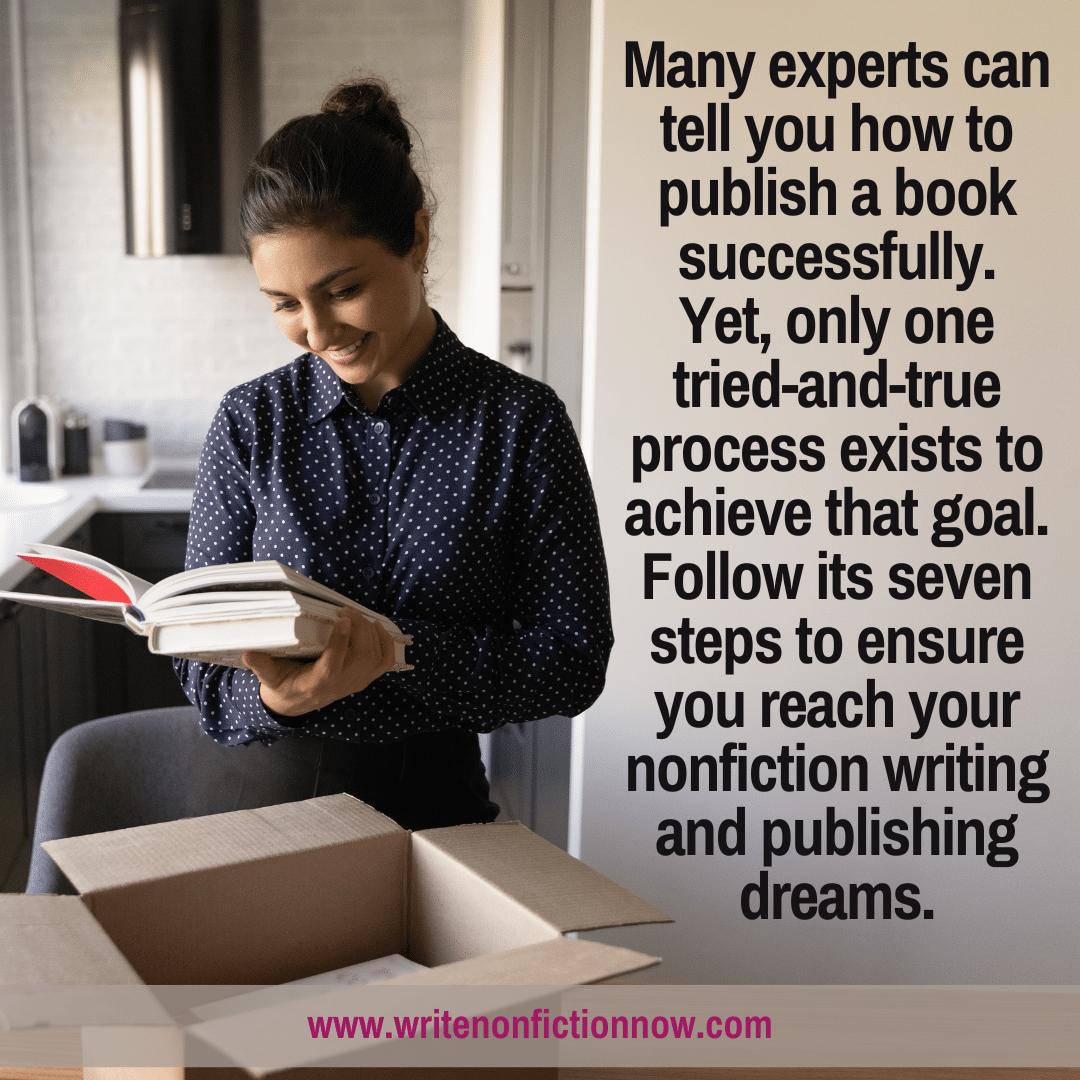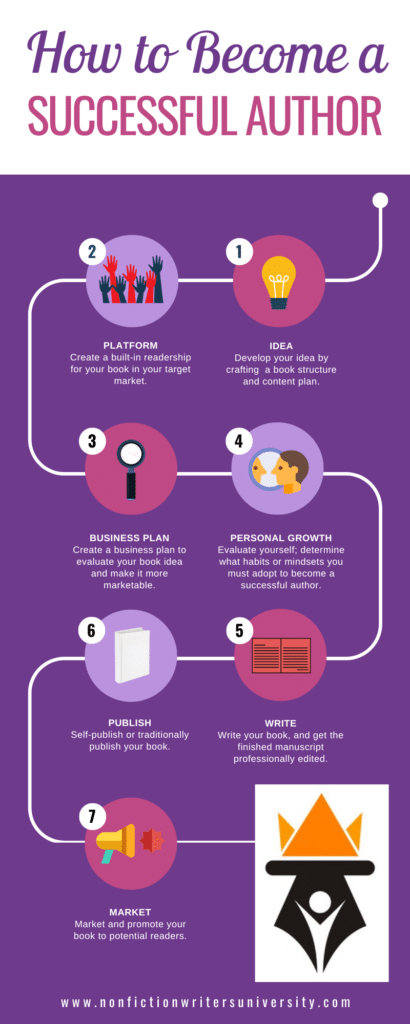Wednesday, May 1, 2024

Lots of people offer advice on how to become a successful nonfiction author. But only one tried-and-true process exists to achieve that goal. If you follow its seven steps, you will reach your writing and publishing dreams.
How do I know this process works better than those taught by other experts? I have used it in my career and landed three traditional publishing deals to date, self-published numerous books, and have had all my titles become Amazon bestsellers.
Plus, I have taught this process to my private Author Coaching clients and the members of the Nonfiction Writers’ University. Many of them have completed book projects, written effective queries and book proposals, and, as a result, landed literary agents and publishing deals or self-published their work.
The seven-step process I teach is not based solely on my experience. Instead, it’s based on years of learning from other experts, like the agents, self-publishing pros, acquisitions editors, designers, editors, bloggers, and marketing experts I interviewed for the Nonfiction Writers’ University. (All of these interviews are archived for members to access at any time.) I also learned from a variety of New York Times bestselling authors, like Brendon Burchard, Gabby Bernstein, and Gay Hendricks, and applied what they shared.
So, what are the seven steps to becoming a successful nonfiction author? Let’s explore them now.

1. Idea
First comes the idea. The lightbulb turns on, and you think, “Ah! That’s a good idea for a book.”
Or you decide to become an author; that’s an idea, too. Then, you choose a topic to write about—you develop a book idea.
You might even have several book ideas, which is excellent! Now, you can develop a business model that helps you publish all your books successfully.
Remember that your idea must be marketable, meaning it must have the potential to sell. Otherwise, you will struggle to become a successful author. (More on this topic in step three.)
Every nonfiction writer needs to build an author platform, or an audience ready and willing to purchase their book once it is published. Most aspiring authors balk at this process.
However, if you want your book to be read, an author platform is necessary. Otherwise, when you market and promote your book, no one will be paying attention. Traditional publishers won’t even consider aspirating nonfiction authors who have not created an audience for a book; the publisher wants to know you can help sell the book upon release.
Additionally, the fact that you have attracted an audience shows your expertise. People following you on social media and signing up for your email list indicate that they perceive you as an expert. Experts write nonfiction books.
Even if you self-publish, you need a built-in audience for your book. So, it’s best to engage in platform-building activities like posting on social media, blogging, developing an email list, or podcasting. Ultimately, you’ll be glad you laid the groundwork for getting your book into readers’ hands.
3. Business Plan
Most writers are creatives. Therefore, they don’t consider creating a business plan for their books or a business plan for their writing careers. Yet, both help you reach your writing and publishing goals.
Publishing is a business. Thus, you need a business plan for your career as a writer and author and for each book you produce.
Publishers require nonfiction authors to create a business plan for a book. They call this document a book proposal. And, if they acquire your book for publication, they turn your book proposal into their in-house business plan for your book.
If you self-publish, you are your own publisher. Therefore, you are responsible for producing a business plan for your book to help it succeed.
Creating a business plan for your book also helps ensure your book idea is marketable. That fact alone makes it worthwhile to complete this step. After all, you don’t want to write a book that won’t sell.
Your business plan or proposal also helps you develop your book’s content. When done with the plan, you have a clear content plan to follow as you write.
4. Personal Growth
Most publishing pros or Author Coaches don’t discuss personal growth for writers and aspiring authors. But this is the most important step in the process of becoming a successful author.
If you’ve ever experienced writers’ block, overwhelm, or fear related to the tasks necessary to achieve your goal of successful authorship, you can appreciate the need to immerse yourself in some sort of personal development work. When you work with a coach, you uncover why you aren’t writing, procrastinate, or can’t make decisions that move your book project and career forward. You understand how your habits and mindsets hold you back from being the type of person who can succeed in the publishing world. More importantly, you discover how to change yourself so you can achieve your writing goals.
The solution is simple: take on the identity of a successful author. Then, your habits and mindsets will allow you to do all the things necessary for successful authorship, such as building an author platform, taking a business approach to your books and career, writing consistently, submitting your work, and marketing your book.
I continually seek ways to enhance my personal growth—usually with coaching. This helps me take bold action toward my writing career goals. “Working on myself” also helps me become more productive.
I once heard Gay Hendricks talk about how much money he spent (between 50K and 100K) per year on his personal growth. He attributed his success as an author to this investment in himself, which included joining coaching programs and masterminds.
5. Write
Of course, you must write your book! That requires courage, focus, and clarity, as well as supportive habits and mindsets.
Creating your book’s business plan gives you a clear vision and a definitive writing plan for your book. Now, you need to follow your plan during daily writing blocks placed on your calendar.
Show up consistently to write, and you will produce a book manuscript. Stay focused on your vision for the book and its content plan, and you will produce a solid first draft.
Of course, you’ll also need to revise your first draft and then work with editors. This takes a willingness to change your manuscript to help it be as marketable as possible.
6. Publish
Publishing a book requires knowing how you want to publish your book. Once you have made that decision, you can proceed to take actions that get your book out into the world.
Suppose you choose to publish your nonfiction book traditionally. In that case, you’ll need to produce a query letter and a formal book proposal. Then, you’ll pitch agents or small publishers using these documents.
If you choose to self-publish, you must hire a team of editors, proofreaders, and designers to help you prepare your book for publication. Then you’ll need to use a service like [Ingram Spark[(https://www.ingramspark.com/) to publish it.
7. Market
Finally, you must hire someone to market and promote your book or learn to do it yourself. Many writers dislike this task, which is similar to building platform, and feel it takes them away from writing.
However, marketing and promoting your book can be fun, exciting, and fulfilling. After all, every book you sell means another person is reading what you wrote…and you are making a difference in their lives.
Keep that fact in mind, and marketing will become a task you enjoy.
There’s More to Authorship than Writing
Once upon a time, a marketable idea and good writing were enough to ensure successful authorship. In today’s competitive publishing world, you need more than that to succeed.
Follow the seven steps described above to increase your chances of producing books that sell and creating a successful career as a nonfiction author.
How do you plan to ensure you become a successful nonfiction author? Tell me in a comment below. And, please share this post with a writer who might benefit from reading it.

Would you like to write and publish nonfiction work, like articles, blog posts, books, or reports…and become a successful (and productive) author? Join the Nonfiction Writers’ University. Get the basic education you need and author and personal growth coaching to help you succeed as a nonfiction writer.
Enjoy a 30-day trial membership for only $1. If you’ve felt the desire to get coached and be supported as you pursue authorship, this program is for you. Participate in monthly group Author Coaching sessions and gain access to an extensive archive of writing and publishing resources.
Photo courtesy of NejroN.
Nina Amir, the bestselling author of How to Blog a Book and The Author Training Manual, is a speaker, a blogger, and an author, book, blog-to-book, and high-performance coach. Known as the Inspiration to Creation Coach, she helps creative people combine their passion and purpose so they move from idea to inspired action and positively and meaningfully impact the world as writers, bloggers, authorpreneurs, and blogpreneurs. Some of Nina’s clients have sold 300,000+ copies of their books, landed deals with major publishing houses and created thriving businesses around their books. She is the founder of National Nonfiction Writing Month, National Book Blogging Month, and the Nonfiction Writers’ University. As a hybrid author she has published 19 books and had as many as four books on the Amazon Top 100 list at the same time. Her most recent book is called Creative Visualization for Writers, and tomorrow her 19th book will be released, The Write Nonfiction NOW! Guide to Creativity and Flow. Find all her books at booksbyninaamir.com or find out more about her at ninaamir.com.